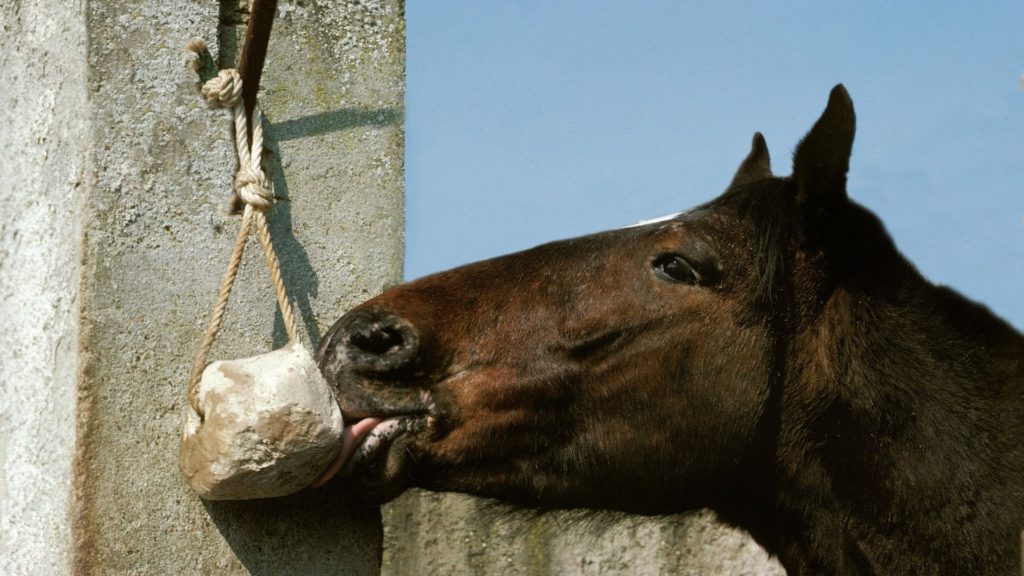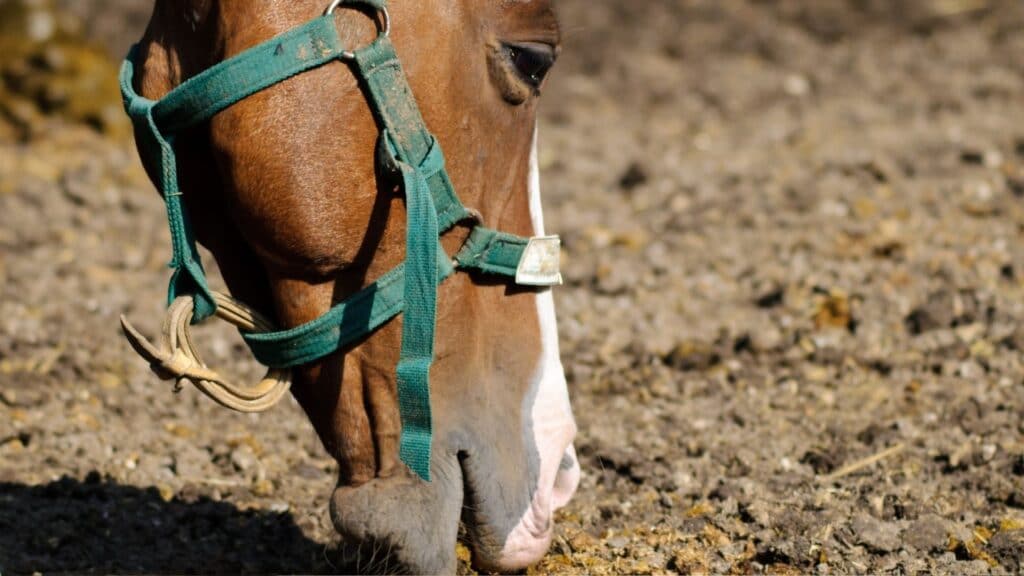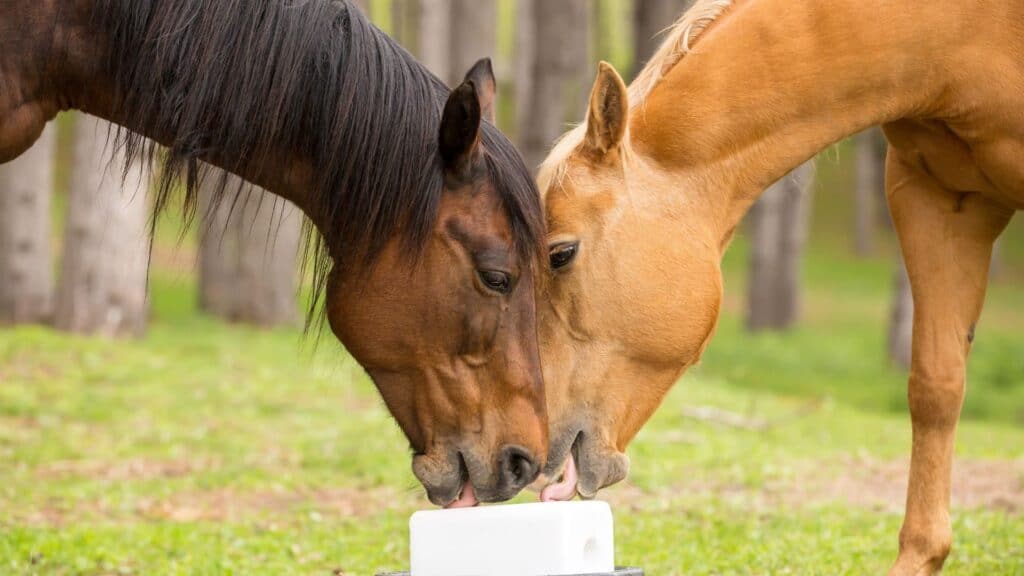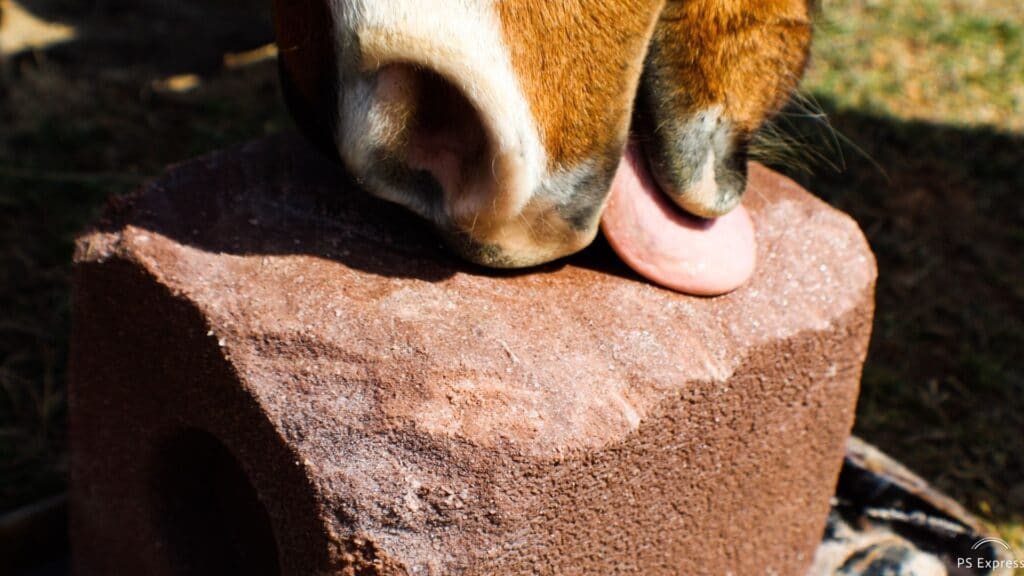Last updated: June 27, 2023
Recently my grandson was cleaning a stall and asked me why his horse licked so much salt. Instead of answering, I decided to quiz him and asked, do horses need salt, and can they get enough from a mineral block?
Horses need salt in their body for the proper function of their muscles and nerves. A typical horse requires about 10 grams of salt per day. However, horses that lose excessive fluid through sweat need more sodium than sedentary animals. Mineral blocks aren’t the preferred method of providing a horse salt.
Some horse owners stray from basic feeding principles and neglect their animal’s salt intake. This transgression can result in adverse health issues and suboptimal performance.
This article is one in a series I wrote about horses’ dietary needs. The previous article, What do Horses Eat? An Equine Nutrition Guide covers the basics you need to know to feed your horse correctly.

Why Horses Need Salt
Just like you and me, horses need certain things in their food to stay healthy. One of those things is salt, also known as sodium chloride. This is not just any ordinary stuff we sprinkle on our food; it’s super important for horses.
You see, horses need a trigger to drink, and salt is perfect for this. It makes them feel thirsty, so they drink more water. This is really important because if horses don’t drink enough water, they can become dehydrated. Dehydration is a big problem and can make them very sick.
Let’s break down salt a little. It’s made up of two parts: sodium and chloride. Both of these parts do some pretty cool jobs for a horse’s body. Sodium is like a superhero for a horse’s muscles. It helps them work right. It’s also the go-to helper for the nerves in a horse’s body, helping signals move around.
Plus, it even helps with digesting protein, a part of their food. On top of that, sodium is also really good at helping the horse’s body absorb the good stuff from their food. Then there’s chloride. Chloride has a big job in helping to move waste (like carbon dioxide) from the horse’s body parts to the lungs. It also helps to keep the horse’s blood ph at proper levels.
Now, we can’t just give every horse the same amount of salt. It’s like shoes; one size doesn’t fit all. Some horses may need more salt; some may need less. It depends on how active the horse is, what the climate’s like where the horse lives, and how fit the horse is.
So remember, just like us, horses need things in their diet to stay healthy and strong. And for horses, salt is one of those special things. It’s more than just a flavor for their food – it’s a key part of their health.

Spotting Salt Deficiency in Horses
When our beloved horses lack essential sodium chloride, it can spell serious trouble for their health. It’s vital for horse owners to be aware of the signs that indicate a salt deficiency. Some key symptoms include:
Dehydration: The Silent Threat
Dehydration in horses is caused by the depletion of water and electrolytes, leading to distress. It happens when a horse loses more water than it’s taking in. If not addressed quickly, dehydration can turn fatal.
How does a horse lose water? The most common way is through sweat. Horses need to sweat to cool down, especially when working hard in hot weather. They can lose vast amounts of fluid this way.
Lack of water supply, diarrhea, or fever can also lead to dehydration. Thankfully, most times, dehydration can be remedied with water and electrolytes.
Unsteady Movement: A Telltale Sign
Have you noticed your horse having difficulty walking or experiencing muscle twitching or spasms? These could be signs of salt deficiency. Sodium is vital for nerve signals and muscle function. This symptom is most common after exercise when the horse looks stiff and its muscles are trembling – what horse owners often refer to as “tying up.”
In severe cases, when salt levels drop significantly, a condition called hypervolemic hyponatremia may occur, requiring immediate medical attention and potentially an IV of electrolytes.
Unusual Eating Habits: A Warning Bell
If your horse starts licking dirt and rocks or biting tree bark, it could be a sign they’re craving salt. These odd behaviors aren’t always due to mineral deficiency, but they are certainly a red flag that your horse might not be getting enough salt.
Equine Anhidrosis: A Lack of Sweat
Equine anhidrosis, or the inability of a horse to sweat, can be another symptom of salt deficiency. While there can be multiple causes, a lack of essential minerals is one. This condition is most common in athletic horses in hot climates.
Other Symptoms to Watch Out For
If a horse’s mineral deficiency isn’t addressed, it can lead to weight loss, inadequate milk production in lactating mares, lethargy, stunted growth, and in extreme cases, even anorexia. As horse owners, we must always keep an eye out for these signs of salt deficiency. Our horses’ health and happiness depend on it.
Deciphering the Right Salt Amount for Your Horse
Understanding how much salt to feed your horse is crucial to maintaining their good health. Let’s break it down:
The typical horse, weighing about 1,000 pounds, needs roughly two tablespoons of salt every day for basic upkeep. However, if you have a high-performance horse, they may need a bit more salt because they sweat more.
It’s important to remember that, just like with anything else, too much salt can lead to problems for your horse.
The Danger of Salt Overload
Salt toxicity, or salt poisoning, can happen if a horse eats a lot of salt but doesn’t drink enough water to balance it out. This usually happens if a horse refuses to drink bad-tasting water or doesn’t have enough water available.
Horses that are fed incorrectly balanced feeds or aren’t used to a high-salt diet can also be more prone to salt poisoning. This condition can affect the horse’s digestive system and nervous system, leading to serious issues like blindness, seizures, and even paralysis.
As horse owners, we need to make sure our horses get the right amount of salt—not too little and not too much. It’s a delicate balance, but it’s essential for keeping our horses happy and healthy.

Salt Forms for Horses
When it comes to caring for horses, ensuring they get the right nutrients is key, and one nutrient that often comes up in the conversation is salt or sodium chloride. Horses can naturally get this from hay and pasture grass, but usually, these sources don’t provide enough for their needs. That’s why we use things like salt licks and mineral supplements.
Salt Blocks: An Essential but Limited Resource
Salt blocks are common in many stables. They’re left out in stalls or areas where horses can freely access them whenever they like. You might have even seen those smaller blocks that hang from a rope—those are made to be easy for your horse to reach.
But here’s a surprising fact: horses have smooth tongues, not rough like a cat’s tongue. Because of this, they don’t get a lot of salt when they lick a block. Some horses do okay with this, but hard-working horses can’t get enough salt this way.
Also, horses that stay in stalls can sometimes lick the block too much when they’re bored, which can lead to getting more salt than is healthy.
Loose Salt: A More Effective Option
Loose salt might be a better choice for your horse. You can mix it right into their feed, which lets you control how much they get each day. Some mineral and electrolyte supplements also contain free salt, which can be a good addition to your horse’s diet. Just be sure to check the ingredients and follow the feeding directions.
If your horse spends a lot of time in the pasture, consider putting out a feeder with loose salt. This is a simple way for them to get salt in an easy-to-eat form. Even horses that graze all day might still need a little extra help.
Which Salt Lick is Best?
As we discussed earlier, licking a salt block might not give a horse all the salt it needs each day. What we recommend is a two-part approach: add loose salt to your horse’s feed and have a white salt block available too. This way, your horse gets a regular salt supply in their feed and can top up with a lick from the block if they feel the need for a little extra.

Are mineral blocks a good source of salt?
Mineral blocks are not ideal for providing horses with daily salt needs. Like any licking block, they don’t deliver adequate portions to animals with a smooth tongues. However, horses are individuals, and your animal may take to a mineral block and enjoy licking better than most other animals.
The block is over ninety percent salt with additional essential other minerals, so it can’t hurt. Just be sure and monitor your horse to ensure he gets the necessary amounts of vitamins and minerals.
Unraveling the Salt Sources of Wild Horses
Wild horses are the epitome of resilience and adaptation. For thousands of years, they have withstood challenging conditions and changing climates, and their secret to survival partly lies in their ability to secure essential nutrients like salt from their natural environment.
Wild horses reside in a wide array of habitats across the world, and their source of salt differs based on the unique characteristics of these environments. Take, for instance, those that roam near coastlines where salt is abundant. Here, the horse’s quest for salt is met by simply licking the salty surfaces found in these areas, ensuring they fulfill their daily sodium needs.
But what about wild horses that inhabit regions where salt isn’t as readily available? These horses have adapted to their environment in fascinating ways. They consume a variety of plants that contain trace minerals, effectively meeting their nutritional needs. Certain plant species can provide these crucial minerals, ensuring the horses maintain their health and vigor.
Moreover, wild horses are known to cover large distances to access regions where salt is more plentiful. This is indicative of their incredible determination and natural instinct for survival. They recognize the vital role salt plays in their overall health and are willing to journey far and wide to ensure they get enough of this valuable resource.
In sum, whether by licking salt-rich surfaces near the ocean, consuming mineral-laden vegetation, or traveling to salt-rich locales, wild horses have found a way to secure their salt requirements. Their resourcefulness is indeed a testament to their ability to adapt and survive in the wild.
Conclusion: Striking the Salt Balance for Horses
The role of sodium chloride in a horse’s health cannot be overstated. It’s the engine that keeps the complex system of their bodies running smoothly. Failing to meet their salt needs can lead to consequences such as lethargy, muscle stiffness or “tying up,” and even dehydration.
The most effective way to ensure your horse gets the right amount of this crucial mineral is by adding it to their feed. Picture two tablespoons—that’s the daily salt dosage needed for an average-sized horse.
But don’t forget about the power of ‘free choice.’ This means always having a salt block or loose salt available, allowing your horse to self-regulate its intake based on individual needs.
In essence, maintaining the right balance of sodium chloride in your horse’s diet is a simple yet vital part of ensuring their well-being. With the correct balance, your horse can continue to thrive, embodying strength and vitality.
FAQ
Do horses need salt blocks in the summer?
Horses especially need salt blocks because the high temperatures reached in the summer months cause them to lose essential minerals through sweating. They must replace the lost minerals, and salt blocks are a good source. It’s also essential that horses have fresh water and someplace to get out of the sun during the summer.
Do horses need a salt block in the winter?
Yes, horses need salt year-round to maintain a proper chemical balance. In the winter, some horses avoid drinking and are at risk of dehydration; salt makes them thirsty and encourages drinking.

About the Author: Miles Henry
Lifelong Horseman | Racehorse Owner | Published Author
Miles Henry brings over 25 years of hands-on experience training and owning Thoroughbred racehorses. Raised with Quarter Horses and Appaloosas, he’s spent a lifetime learning from horses—on the track, in the barn, and in the field. Today, he runs a small but successful racing stable in Louisiana and shares real-world insights on HorseRacingSense.com, helping horse owners, fans, and bettors navigate the sport with confidence.
📚 Books: View Miles’s books on Amazon »
🎧 Podcast Guest: Animal Tales Ep. 32 |
YouTube Interview
📩 Newsletter: Sign up for racing tips and horse care advice »
🔗 Follow Miles:
Twitter |
Facebook |
YouTube


